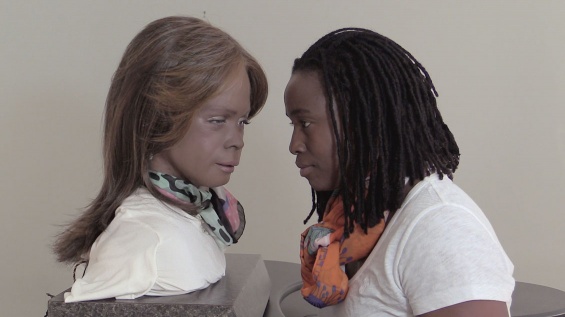 Exhibition
Paul Ramírez Jonas: Half-Truths
07/05/17-09/17/17
Exhibition
Paul Ramírez Jonas: Half-Truths
07/05/17-09/17/17
Conversations · Exhibition-Related
Manufacturing Truth: Machine Learning and Bias

Stephanie Dinkins, Sentients, 2015 (still). HD video, color, sound. Courtesy the artist
Livestream for this event will be available at 7 PM —>
Bringing together presenters from fields including art, journalism, and sociology, this panel will investigate how algorithms shape our lives in realms as disparate as criminal justice, online shopping, and social media. Algorithms affect everything from healthcare and insurance premiums to job opportunities and predictive policing. How might we resist discriminatory artificial intelligence and become informed digital citizens?
Katherine Cross is a sociologist and PhD student at the CUNY Graduate Center in New York City who studies antisocial behavior online. Her work has appeared in Time, the Guardian, Rolling Stone, the Verge, Bitch, and numerous other outlets; she is also a widely published videogame critic and a weekly columnist at Gamasutra.
Stephanie Dinkins, an artist and a professor at Stony Brook University, is interested in creating platforms for ongoing dialogue about artificial intelligence as it intersects race, gender, aging, and our future histories. She is particularly driven to work with communities of color to develop deep-rooted literacy with artificial intelligence and co-create more culturally inclusive and equitable AI. Her art employs lens-based practices, the manipulation of space, and technology to grapple with notions of consciousness, agency, perception, and social equity.
Jeff Larson is a reporter at ProPublica. He worked on their Machine Bias series, a Pulitzer Prize finalist for Explanatory Journalism, and is a winner of the Livingston Award for the 2011 series Redistricting: How Powerful Interests are Drawing You Out of a Vote.
Surya Mattu is an artist and engineer based in Brooklyn. He is currently the data reporter at GMG’s Special Projects Desk. Previously, he was a contributing researcher at ProPublica, where he worked on Machine Bias, a series that aims to highlight how algorithmic systems can be biased and discriminatory. Machine Bias was a Pulitzer Prize finalist for Explanatory Journalism. Mattu was also a fellow at Data & Society. He has recently shown work at the Victoria & Albert Museum, the Whitney Museum of American Art, Haus der Kulturen der Welt, and Bitforms.
Sponsors
“Paul Ramírez Jonas: Half-Truths” is made possible through support provided by the Shelley & Donald Rubin Foundation.
Artist commissions at the New Museum are generously supported by the Neeson / Edlis Artist Commissions Fund.
Artist residencies are made possible, in part, by Laurie Wolfert.
Additional support is provided by the Toby Devan Lewis Emerging Artists Exhibitions Fund.
We gratefully acknowledge the New Museum Council for Artists’
Research and Residencies: Alexandra Bowes, Gregory R. Miller and Michael Wiener,
and Laurie Wolfert, Co-Chairs; Shelley Fox Aarons and Philip E. Aarons,
Emily Bingham and Stephen Reily, Terry Gamble Boyer and Peter Boyer,
Isolde Brielmaier, Jenny Choo, Lonti Ebers and Bruce Flatt, Julia Gruen, Ruben Levi,
and the Mimi Saltzman Foundation.
Further exhibition support is provided, in part, by public funds from the New York State Council on the Arts with the support of Governor Andrew Cuomo and the New York State Legislature, and from the New York City Department of Cultural Affairs in partnership with the City Council.

Endowment support is provided by the Rockefeller Brothers Fund, the Skadden, Arps Education Programs Fund, and the William Randolph Hearst Endowed Fund for Education Programs at the New Museum.
